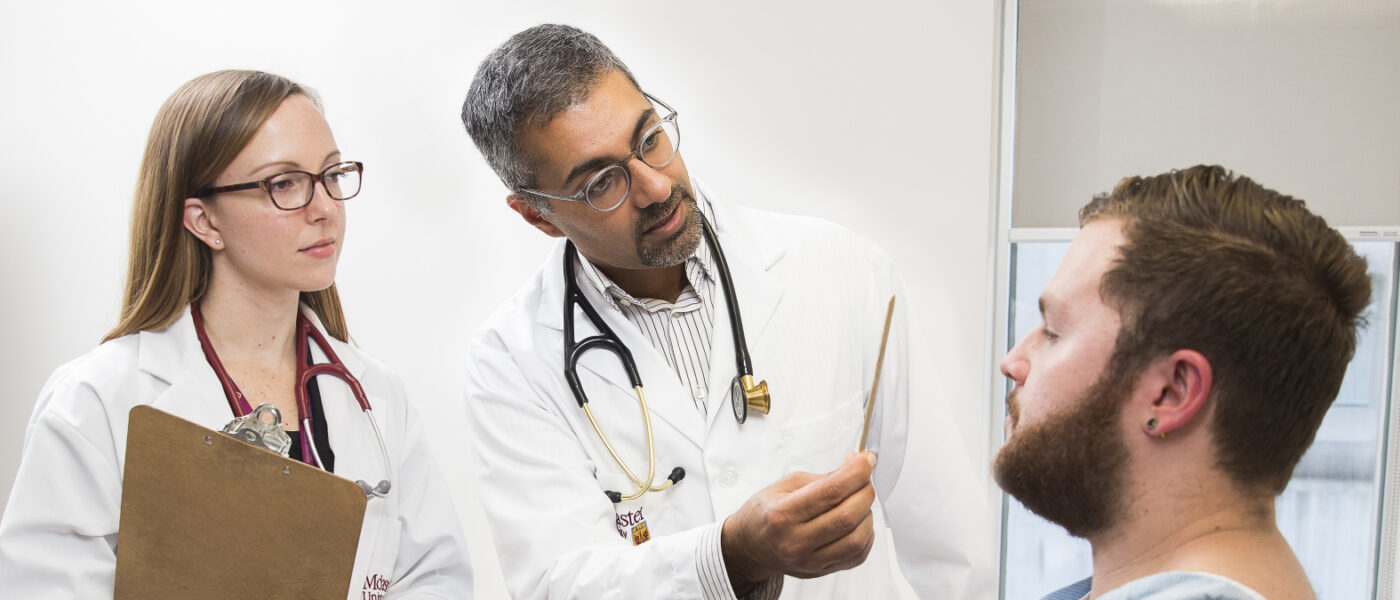GENERAL INTERNAL MEDICINE PGY 4-5
Residency Program
Welcome to McMaster’s General Internal Medicine Subspecialty Residency Program for the training of PGY4 and PGY5 residents after completion of core Internal Medicine. The philosophy of the program is to train residents and prepare them for practice with competencies in inpatient medicine, outpatient practice, consultative care, complex multisystem care, and to be comfortable with uncertainty.
Welcome
Welcome to the General Internal Medicine (GIM) Subspecialty Residency Training Program at McMaster University. We are a medium-sized program that prides itself on maintaining the informality, flexibility and comradery of a small program.
The goal of the General Internal Medicine Residency Training Program at McMaster University is to train residents to become excellent General Internists by providing the necessary skills and knowledge through diverse clinical exposure, high-quality teaching, and mentorship.
Upon completion of the program, residents should have gained the skills and knowledge to practice General Internal Medicine in its breadth, including multisystem assessment and stabilization, acute and chronic care, perioperative care, and an understanding of obstetrical medical care. This program builds upon the core competencies gained in the three-year core Internal Medicine program, with additional focus on those roles and competencies required of a General Internist.
Building on the current strengths of the program, we will be providing further and/or enhanced exposure to quality improvement, informatics, social medicine, and other educational opportunities.
Entry Requirements
Applicants would apply through the CaRMS Medicine Subspecialty Match (MSM). Full requirements can be found on their website.
Application deadline
Please refer to the CaRMS website.
Program Overview
To prepare residents for successful careers in clinical General Internal Medicine, both in academic and community centres, in all of the following areas:
- Clinical education including Simulation.
- Quality improvement and patient safety.
- Clinical research.
In addition, there can be additional opportunities for training or fellowships in the PGY5 year, depending on the resident’s progress and subject to the Program Director’s approval.
Upon completion, residents will be ready to take on leadership roles in hospital and community-based practice and will be excellent candidates for university faculty positions. Residents will have had ample, guided opportunities to develop their skills as clinical teachers.
Objectives
The objectives of the program are to obtain training in GIM, not just in clinical skills expertise but also in the philosophy of what it means to be a General Internist. Our goals are to successfully train residents for varying career options ranging from research-based, academic careers, to clinically-oriented academic careers and community GIM in its various forms. We place special emphasis on the development of outpatient care as part of the training program as this is an area of limited exposure for most residents upon entry to our program.
For the training program, core requirements will consist of the following:
- 2 rotations Junior Attending on the Clinical Teaching Unit (CTU).
- 2 rotations Community GIM.
- 2 rotations Medical Stepdown Unit (MSCCU) (Level 2 ICU).
- 2 rotations Obstetrical Medicine.
- 1 rotation Perioperative Clinics.
- 2 rotations Ward Consultation Service.
- 1 rotation ICU (generally in the community).
- 1 rotation Medical Diagnostics (ECG, Holter, stress test, ambulatory BP and PFT).
- 1 rotation ER Consult Service (Medicine consults in ER) (two separate two-week rotations).
- 2 rotations GIM Outpatient Clinics (any of IMRAC, CIMRAC, GIMRAC).
- 10 rotations of further training individualized to the trainee’s career path, as approved by the Program Director.
- Continuity Clinic (1/2 day per week) during both years.
It is strongly encouraged to complete a minimum of 2-3 Community GIM rotations.
Each rotation is four weeks in length except for the ER Consult Service.
Both a research project and a QI project are mandatory during the program under the supervision of the respective faculty leads and Program Director.
Reasons for the Program
The need for more General Internists, with advanced general internal medicine, and academic and research training, has been recognized by all sectors of Canadian health education and health care. Specifically:
General Internists play a vital role in the care of increasingly complex patients with problems that cross sub-specialties.
General Internists make a major contribution to the student, resident and primary care practitioner education. Leadership roles in education (ie. Directors of Medical Clinical Teaching Units) are increasingly being filled by General Internists.
Medical schools across Canada need clinical epidemiologists who can teach clinical medicine, look after the problems of patients on general medical units and medical clinics, and conduct research concerning diagnostic procedures and treatments used in internal medicine.
They address dilemmas that internists face every day in prognosis, diagnosis and therapy. The methodology taught by the Department of Clinical Epidemiology and Biostatistics is ideal training for this pursuit.
Hospitals across Canada are in urgent need of General Internists.
There is a national trend toward generalism as outlined in the Barer-Stoddart Report, and a parallel movement in the U.S.

